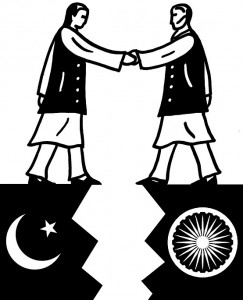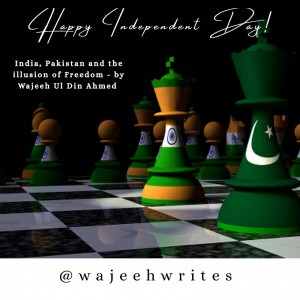Nuclear diplomacy of Pakistan
Aftab H. Wahla
Since the dawn of the nuclear age – with the dropping of nuclear bombs on Hiroshima and Nagasaki in 1945 – nuclear diplomacy has been on the centre stage in international affairs. The post-war multilateralism has given significant expansion to the scope and jurisdiction of traditional diplomacy and, today, economy, technology exchange, scientific cooperation, financial collaboration and international law fall within its ambit. Nuclear diplomacy has further broadened the scope of conventional diplomacy. Nuclear diplomacy can be explained as an expression of a country’s nuclear policy, projection of its peaceful nuclear credentials, and articulation of a forceful narrative to justify its stance over various international initiatives aimed at nonproliferation and disarmament. It is also instrumental in convincing the international community on the significance of nuclear technology for national security and national development. In the following paragraphs, an in-depth discussion will be made regarding the underlying objectives of the nuclear diplomacy of Pakistan, and the official position that the country adheres to on different nuclear issues.
Nuclear diplomacy of Pakistan rests on some well-established principles and objectives. The establishment of beneficial relations with all other states based on sovereign equality, contribution to the global security and arms-control architecture, strict compliance with global norms and best practices as a responsible nuclear state, preservation of peace and strategic parity and ensuing regional stability at minimalistic level of armament, advocacy for a non-discriminated access to peaceful nuclear technology for socioeconomic development, and contribution as a mainstream partner in global nonproliferation efforts are some guiding principle and objectives that provide conceptual framework for nuclear policy formulation and decision-making process in Pakistan.
Arms control and disarmament including nonproliferation is an important pillar of nuclear diplomacy. Arms control aims at limiting the number of weapons and regulating their use through bilateral and multilateral treaties, agreements and arrangements, whereas disarmament targets the complete elimination of nuclear weapons and advocates for the minimization of the level of conventional weapons. In view of regional and strategic imperatives under which Pakistan had acquired the status of a nuclear state, it has adopted a position that reflects its security concerns and, at the same time, unearths the discriminatory nature of international arms control and disarmament regimes. Treaty on the Nonproliferation of Nuclear Weapons (NPT), which aims to legalize the nuclear status of P5—China, France, Russia, the United Kingdom, and the United States—and attempts to delegitimize the nuclear status of non-P5 states, i.e. Pakistan, India, North Korea and Israel). The inherent discriminatory nature of the treaty and India’s hegemonic designs have rendered the country non-signatory. Pakistan has neither signed nor ratified the NPT.
 The Comprehensive Test Ban Treaty (CTBT) is another important multilateral instrument that prohibits all nuclear test explosions. Advanced level of Indo-Russian negotiations over the acquisition of S-400 surface-to-air missile defence system by India; nuclearization of Indian Ocean with the deployment of INS-Arihant, a nuclear-powered ballistic missile submarine; and recent test launch of hypersonic ballistic missiles are some regional imperatives that are forcing Pakistan not to sign and ratify CTBT. Pakistan has instead offered a mutual test ban arrangement which India has rejected.
The Comprehensive Test Ban Treaty (CTBT) is another important multilateral instrument that prohibits all nuclear test explosions. Advanced level of Indo-Russian negotiations over the acquisition of S-400 surface-to-air missile defence system by India; nuclearization of Indian Ocean with the deployment of INS-Arihant, a nuclear-powered ballistic missile submarine; and recent test launch of hypersonic ballistic missiles are some regional imperatives that are forcing Pakistan not to sign and ratify CTBT. Pakistan has instead offered a mutual test ban arrangement which India has rejected.
The Fissile Material Cut-Off Treaty (FCMT) was designed to eliminate the fissile material stockpile and harmonize the NPT and CTBT. Pakistan is the only country that has blocked the negotiation on FMCT as it opposes the treaty owing to discriminatory nuclear policies of the West on civilian nuclear technology, growing conventional and non-conventional imbalance in the region, absence of any arms-control regime between India and Pakistan, acquisition of destabilizing capabilities by India to nuclearize outer space and, most importantly, the likelihood of erosion of the nuclear deterrence in the region, especially after the Indo-US nuclear deal. The RSS-BJP regime in India has further deepened the sense of insecurity in Pakistan. So, it will continue to adhere to its rigid approach on FMCT.
In addition to the above-mentioned conventions, Pakistan has also ratified conditionally the Convention on the Physical Protection of Nuclear Material and ratified, unconditionally, the Biological Weapons Convention (BWC) and Chemical Weapons Convention (CWC). In a keynote address at launch of Arms Control & Disarmament Centre (ACDC) on October 30, 2019, Foreign Secretary Sohail Mahmod justified Pakistan’s official stance on arms control and disarmament. He argued that BJP-caused strategic instability and threat of dismemberment illustrated “serious perils for peace that stem from extremist ideology and hegemonic ambitions”. Pakistan could not be expected to one-sidedly pick up the burden of maintaining peace all times (by accepting nuclear disarmament).
Articulation of a robust narrative to convince the international community regarding eligibility of Pakistan to join the multilateral export control regime is an integral part of our nuclear diplomacy. Multilateral export control groups constitute an important pillar of international nonproliferation regime, and membership of these groups can help Pakistan to access international nuclear trade for peaceful purposes like nuclear power generation, health, agriculture and industry-related applications of civil nuclear technology. Nuclear Suppliers Group (NSG), Australia Group, Missile Technology Control Regime (MTCR) and Wassenaar Arrangement are export control regimes reinforcing global nonproliferation efforts.
The 48-member NSG was established in 1974 in response to India’s nuclear explosions. It aims to prevent the civil nuclear trade from being misused for military purposes. Apart from robust legislative, regulatory and enforcement mechanisms for internal control, NSG requires mandatory adherence to NPT or Nuclear-Weapon-Free Zone treaty which has rendered the inclusion of non-NPT states in the group next to impossible. But, here again, the West has adopted discriminatory policies vis-à-vis India and Pakistan. US-India civil nuclear deal and subsequent issuance of India-specific waiver by NSG in 2008 have helped India do nuclear trade with the USA. In addition, this duplicity has brightened the prospects for India’s membership of the prestigious nuclear club on the back of lucrative nuclear business opportunities it offers. Pakistan has vehemently opposed this duplicity and demanded strict adherence to criteria-based admission, rather than a country-specific entry. Although our bid to join NSG in 2016 met with failure along with that of India, it did help highlight our nuclear credentials. Similarly, Pakistan is not the member of MTCR that aims at nonproliferation of unmanned delivery systems that can deliver weapon of mass destruction (WMDs), though India joined the regime in 2016.
Australia Group that seeks strict adherence to nonproliferation of biological and chemical weapons is also a platform which Pakistan is yet to approach for membership.
Wassenaar Arrangement which is an informal platform to regulate conventional weapon production and trade can be instrumental for increasing self-sufficiency of Pakistan in defense production. Pakistan is not a member of any export control regime, but the country’s strategic policymakers must prepare a strong case for getting membership of these regimes because Pakistan has requisite infrastructure, expertise, manpower and ability to supply NSG-controlled items, goods and services for full range of nuclear applications.  Talks with key nuclear states constitute one of the most crucial areas of Pakistan’s nuclear diplomacy. Mainstreaming of the country’s nuclear programme requires sustained, coordinated and deep engagement with the USA, China, India and other nuclear-capable or nuclear-armed nations. Pakistan needs civilian nuclear technology for various objectives with nuclear power generation being the most important. Since Pakistan is neither a signatory to NPT nor a member of other export control regimes, it cannot do nuclear trade with other countries. In terms of bilateral nuclear talks and negotiations, Pakistan has maintained comprehensive contacts with China, India and USA and regularly engages with other states as well.
Talks with key nuclear states constitute one of the most crucial areas of Pakistan’s nuclear diplomacy. Mainstreaming of the country’s nuclear programme requires sustained, coordinated and deep engagement with the USA, China, India and other nuclear-capable or nuclear-armed nations. Pakistan needs civilian nuclear technology for various objectives with nuclear power generation being the most important. Since Pakistan is neither a signatory to NPT nor a member of other export control regimes, it cannot do nuclear trade with other countries. In terms of bilateral nuclear talks and negotiations, Pakistan has maintained comprehensive contacts with China, India and USA and regularly engages with other states as well.
Sino-Pak nuclear cooperation dates back to the days of Bhutto who signed a clandestine agreement with Mao Zedong and started Pakistan’s nuclear programme for both military and civilian purposes. Pak-China Agreement on Transfer of Civil Nuclear Technology in 1986 was the first publicly-signed nuclear pact. Since the bilateral cooperation remained in the shrouds of mystery, it is alleged that China provided technical assistance in the area of fissile material production and nuclear-weapon designs, besides providing 50kg of weapons-grade uranium to Pakistan. The US-India nuclear deal, and the ensuing prospects of strategic disparity in the region, provided further momentum to enhance the bilateral nuclear cooperation in various areas. Currently, Pakistan is expanding its nuclear-power generation from existing capacity of 1350MW to 3346MW with Chinese assistance. In the area of nuclear cooperation as well, China has stood staunchly with Pakistan and refused to give in to world pressure regarding its deep-rooted, strategic and comprehensive cooperation with Pakistan despite its non-NPT status.
The United States has always linked Pakistan’s nuclear programme to its strategic interests. During Afghan war, and given Pakistan’s inevitable role in combating the Taliban insurgency, US ignored Pakistan’s rapid strides in the development of nuclear weapons and delivery systems, but right after the Soviet withdrawal in 1989, it cut economic and military aid to Pakistan through the Pressler Amendment, and sanctioned the country heavily after its conduct of nuclear tests in 1998. Any possible US-Pak nuclear deal would require Pakistan to cap or freeze its nuclear expansion, limit its ballistic missile programme, dismantle tactical weapons and the delivery systems and adhere to unilateral strategic restraint with respect to India. It is obvious that Pakistan can ill afford unilateral restraint as it will be tantamount to surrendering before Indian hegemonic and expansionist designs. In the perspective of fast-evolving regional and international security dynamics and US-led encirclement policies targeting China, It is certain that US-Pak nuclear talks will remain paralyzed and hostage to US-China rivalry. Nonetheless, it is crucially important for Pakistan to continue its strategic communication and engagement with the United States so as to show them that it has a robust physical security and safety of its civilian and military installations.
Miscommunication and miscalculation can lead to accidental use of, or accidents in, the nuclear installations of both India and Pakistan. It is extremely important for both countries to agree upon some basic contours of nuclear CBMs (confidence-building measures) in order to avoid any mishap. But, unfortunately, India has adopted a very rigid stance. Although it adheres to no first use policy, it is generally taken in Pakistan as eyewash to carry out sub-conventional warfare or launch the so-called surgical strikes.
The most pertinent example of such a CBM is the Agreement on Prohibition of Attacks against Nuclear Installations and Facilities which was signed by India and Pakistan in 1988. Under this agreement, both countries exchange the lists of their nuclear installations on January 1 every year. Both countries have also maintained a moratorium on nuclear tests, and a hotline at the level of DG Military Operations as well. Pakistan has offered, many a time, multiple initiatives to maintain strategic stability in the South Asian region. Strategic Restraint Regime that consisted of three defining elements—stable deterrence, proportionate reduction in armed forces and negotiated settlement of political dispute including Kashmir—was such an initiative that India rebuffed. In the present circumstances, commencement of Indo-Pak nuclear talks is a far-fetched idea. RSS-BJP ideology, which is the interplay of incurable obsession with Pakistan, hegemonic ambitions and religious fanaticism, would continue to pose serious threats to the regional balance both in conventional and non-conventional spheres. In the near future, Pakistan would continue seeking diversification of its delivery systems, expansion in the fissile material production and devise countermeasures to offset the fast-deteriorating strategic balance in the region.
IN the end, it is apt to conclude that nuclear diplomacy plays a significant role in reinforcing strategic stability in the region. Pakistan’s deft nuclear diplomacy has long played a determinant part in steering the country out of multiple crises. From avoiding the signing of NPT to successfully thwarting Western demands for restriction on nuclear enrichment at Kahuta, from concluding civil nuclear agreement with China to fighting a diplomatic battle in the aftermath of 1998 tests, from avoiding penalties in the wake of A.Q. Khan proliferation scam to mainstreaming of Pakistan’s civil nuclear programme, our diplomats have done an exemplary job in the protecting our national interests through intense and nerve-racking diplomacy. It is imperative for the incumbent government to further strengthen the Foreign Office. In this regard, strengthening the arms control and disarmament cell, intense diplomatic drive to highlight the double standards of West on disarmament and nonproliferation, renewed efforts to secure the membership of prestigious Export Control Regime through showcasing the peaceful nuclear credentials of Pakistan, emphasis upon reciprocal Strategic Control Regime in South Asia, signing of civil nuclear agreements with friendly Muslim countries under IAEA’s safeguards, and most importantly, coherent and well-coordinated diplomatic campaign to expose the RSS-BJP ultra-nationalist and extremist irredentist and expansionist thinking so as to justify Pakistan’s constant efforts to strengthen our conventional and non-conventional defense mechanism. Pakistan’s diplomacy must adopt an offensive posture to seek international legitimization of our nuclear status.
 Jahangir's World Times First Comprehensive Magazine for students/teachers of competitive exams and general readers as well.
Jahangir's World Times First Comprehensive Magazine for students/teachers of competitive exams and general readers as well.



